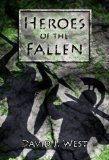A few years ago, while serving as Ward Mission Leader, I was introduced to a young man who had come to church with a less-active member of the ward. I knew Rory (not his real name) from the neighborhood, but had never been formally introduced.
Tag Archives: Book of Mormon
Guest Post: Reconciling a fictional Book of Mormon with Joseph Smith’s stated testimony
The following guest post comes from Mike Parker, a long-time Bloggernacle commenter.
A small percentage of Latter-day Saints are aware that the historicity of the Book of Mormon has its detractors. Among those who are aware of the issues, there has been some discussion on this topic.
Actually, “discussion” is probably too polite a term.
Book Review: “Heroes of the Fallen” by David J. West
[Cross Posted from Sixteen Small Stones]
I don’t typically read LDS Fiction. A lot of it just doesn’t appeal much to me. Those few books that do draw my attention are often either, in my estimation, much too preachy, superficial, and emotionally manipulative on the one hand or on the other veer off into apostasy in order to be edgy, artistic, intellectual, and morally nuanced. Blech.
 However, contrary to my usual interests, last month I picked up a newly released book by David J. West entitled Heroes of the Fallen. I had run across West’s blog a few months earlier, and I had been following his posts. I knew that he was an aspiring LDS author, but I hadn’t followed his blog closely enough to realize that he had a book about to be published. When he announced it’s release, I was intrigued by what I had already gathered from his blog. So I headed over to the local bookstore where he was doing a book signing and purchased an author-signed copy. I finished Heroes of the Fallen in about a week.
However, contrary to my usual interests, last month I picked up a newly released book by David J. West entitled Heroes of the Fallen. I had run across West’s blog a few months earlier, and I had been following his posts. I knew that he was an aspiring LDS author, but I hadn’t followed his blog closely enough to realize that he had a book about to be published. When he announced it’s release, I was intrigued by what I had already gathered from his blog. So I headed over to the local bookstore where he was doing a book signing and purchased an author-signed copy. I finished Heroes of the Fallen in about a week.
The book is set in the ancient America of the Book of Mormon, around 320 or so years A.D. This setting is both a benefit and a challenge for the author. West benefits from a pre-existing setting, complete with unusual names and places, a history, language, political system, and religious beliefs. My favorite fantasy writers, like J.R.R. Tolkien, C.S. Lewis, and Lloyd Alexander, drew upon the histories, myths, and legends of the ancient civilizations with which they were familiar, borrowing names, plots, archetypes, and themes in order to lend weight and coherence to their works. In some ways, Heroes of the Fallen benefits similarly from the Book of Mormon. By adapting and extrapolating from the Book of Mormon, West is able to concentrate on filling in the details and bringing to life a fully-realized, exotic, ancient civilization without having to invent it whole-cloth.
Mosiah 15 and D&C 93: Divine Investiture or Swedenborgian?
In my post on Book of Mormon Doctrine of Deity, Divine Investiture, Representational Modalism, I mentioned the idea that some people hold up Mosiah 15:1-5 as proof that Joseph Smith (as supposed author of the Book of Mormon) originally wrote the Book of Mormon to support a Swedenborgian view of God (aka Serial Modalism) where The Father is a spirit that took on a body called Jesus.
In my opinion, this point of view ignores a lot of facts or at least force fits them. For example, the Book of Mormon also presents both the Spirit of the Lord as being a person as well as the premortal Jesus. It also presents the premortal Jesus as talking from Heaven as a personality separate from the Father.
But there is a bigger problem I have with the assumption that Mosiah 15:1-5 can only be historically read as Swedenborgian and thus (we are told) we must assume Joseph Smith meant it that way.
Do Joseph Smith’s own writings count as counter evidence if he explicitly tells us what he means? Continue reading
The Lynchpin: The Doctrine of Divine Investiture
A while back, KC Kern gave an explanation of the Mormon concept of Trinity. To summarize, Mormons often use the word “God” to refer collectively of the entire Godhead which can be thought of as an entity different but not fully distinct from each individual person in the Godhead. He likened “God” to a corporation, which is legally different from, but not fully distinct from the people that make up the corporation.
I think KC Kern’s explanation of the Mormon concept of Trinity is correct, but is missing (but hints at) one very important point which I wish to expand upon in the next few posts.
Included in the Mormon concept of deity is a doctrine called “Divine Investiture.” A summary of this doctrine is that each person in the Godhead fully represents the entire Godhead to the point of representing and even speaking for the others. [1]
Unfortunately Divine Investiture just doesn’t get the due it deserves. It is usually only trotted out to explain certain scriptures and then not mentioned again until we come to the next scripture that requires it. As such, some people have entirely discounted it as part of the doctrines of the LDS Church. They see it merely as an excuse to ignore or “figure-atize” scriptures that just don’t play well with Mormon’s (supposedly) otherwise Tritheistic doctrines. [2] Continue reading
